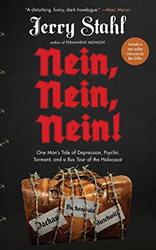In her recently published book, A Beginner’s Guide to America, poet and novelist Roya Hakakian artfully gives insight into the inner life of a newly arrived immigrant observing our nation from its periphery while navigating daily life.
Hakakian’s book is meant for everyone: for those who scaled mountains and waded through rivers to reach our shores; those who comfortably stepped off a boat or plane; those learning English for the very first time; those who have lived here for decades; and those American citizens whose lineage dates back to the Mayflower. Hakakian captures the shock, confusion, awe, humor, and joy a new-to-America émigré experiences while also analyzing both the multiplicity and singularity of our country. She speaks from the heart and draws candidly from her own culture shocks, having fled post-Khomeini Revolution Iran and entered the United States as a refugee in 1985.
In poignantly penned prose, she turns the reader into the outsider looking in. She jostles our complacency and alerts us to all we take for granted. When one comes from a homeland that censors speech, books, news, music, art, movies, and free-flowing hair, America can be both a source of comfort and bewilderment. Consequently, adjustment is a long journey.
When Hakakian studies America’s marketing billboards, bountifully stocked supermarkets, and the American practice of buying — then returning — merchandise, she writes:
They had expected to see the suspension bridges, the underwater tunnels, the endless forests, and bottomless seas. But it is the exercise of returning goods that is the surest sign of America’s greatness to them … Returning items is the proof that the consumer, one of the several manifestations of the citizen, is formidable here. It is the evidence that anything is possible because a one-time decision need not be destiny. You can change your fate here and turn it in for a better one.
Walt Whitman called America the “Greatest Poem.” Hakakian, in her own way, does the same. Leaving no stone unturned, she skillfully examines American cultural paradoxes. The power of poetry and democracy come from making a unified whole out of disparate parts, a notion that is highly relevant, especially when America feels bitterly divided. Hakakian has made a major contribution to the great canon of literature that encourages all Americans to better know themselves. And, by reading her book, one certainly will.
Esther Amini is a writer, painter, and psychoanalytic psychotherapist in private practice. She is the author of the highly acclaimed memoir Concealed—Memoir of a Jewish Iranian Daughter Caught Between the Chador and America, and her short stories have appeared in Elle, Lilith, Tablet, The Jewish Week, Barnard Magazine, TK University’s Inscape Literary, and Proximity. She was named one of Aspen Words’ two best-emerging memoirists and awarded its Emerging Writer Fellowship in 2016. Her pieces have been performed by Jewish Women’s Theatre in Los Angeles and in Manhattan and she was chosen by JWT as their Artist-in-Residence in 2019.


